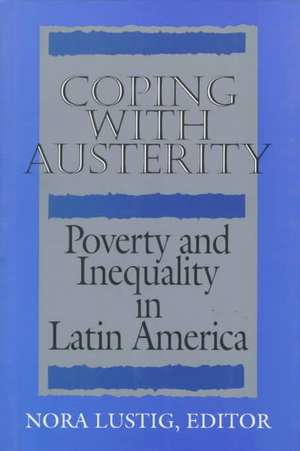Coping with Austerity: Poverty and Inequality in Latin America
Autor Nora Claudia Lustigen Limba Engleză Hardback – sep 1995
Concern about the pervasiveness of poverty and income inequality in Latin America goes beyond the issue of social justice. The persistence of mass poverty and inequality pits different social groups against one another and leads to a polarization that makes consistent economic policy formation difficult. National productivity may also suffer in economies with poorly educated workforces lacking adequate health care. Statistics on poverty and inequality in Latin America are rudimentary and often conflicting. Yet it is known that poverty became more widespread in the region during the last decade as it experienced economic decline. About 180 million people, or two out of every five in the area, are now living in poverty—some 50 million more than in 1980. It is also known that income and wealth are far more unequally distributed in Latin America than in most other developing regions. This book provides a much-needed assessment of how poverty, inequality, and social indicators have fared in several Latin American countries over the past decade. Experts from Latin America and the U.S. focus attention on the extent of poverty and inequality and how they have been affected by the debt crisis and adjustment of the 1980s. They explain that issues of poverty and inequality were neglected as governments in Latin America struggled to restore stability and growth to their economies. Social sector spending declined sharply, affecting both the quality and quantity of services provided. The contributors examine how poverty and inequality are—or are not—being addressed in each country. They also explore the viability of alternative approaches to combating poverty and reducing inequality. They explain that virtually no one denies that governments must take a leading role in the provision of health, education, and other social services. Yet there are sharp debates--over the compatibility of social spending with economic adjustment and stabilization; the priority of social expenditures in relation to other governmental spending; the allocation of funds among different social programs; who should, and should not, benefit; and who should pay the costs. They show that the poor and middle sectors had to pay dearly because their governments, the international community, and the families themselves were not prepared to deal with austerity. The book contains eleven chapters by contributors from universities and research institutions in the U.S. and Latin America, as well as from international financial organizations. It is the result of a project cosponsored by Inter-American Dialogue.
Preț: 278.93 lei
Nou
Puncte Express: 418
Preț estimativ în valută:
53.38€ • 57.07$ • 44.50£
53.38€ • 57.07$ • 44.50£
Carte tipărită la comandă
Livrare economică 17 aprilie-01 mai
Preluare comenzi: 021 569.72.76
Specificații
ISBN-13: 9780815753186
ISBN-10: 0815753187
Pagini: 484
Ilustrații: Illustrations
Dimensiuni: 152 x 229 x 38 mm
Greutate: 0.84 kg
Ediția:New.
Editura: Brookings Institution Press
Colecția Brookings Institution Press
ISBN-10: 0815753187
Pagini: 484
Ilustrații: Illustrations
Dimensiuni: 152 x 229 x 38 mm
Greutate: 0.84 kg
Ediția:New.
Editura: Brookings Institution Press
Colecția Brookings Institution Press
Notă biografică
By Nora Claudia Lustig
